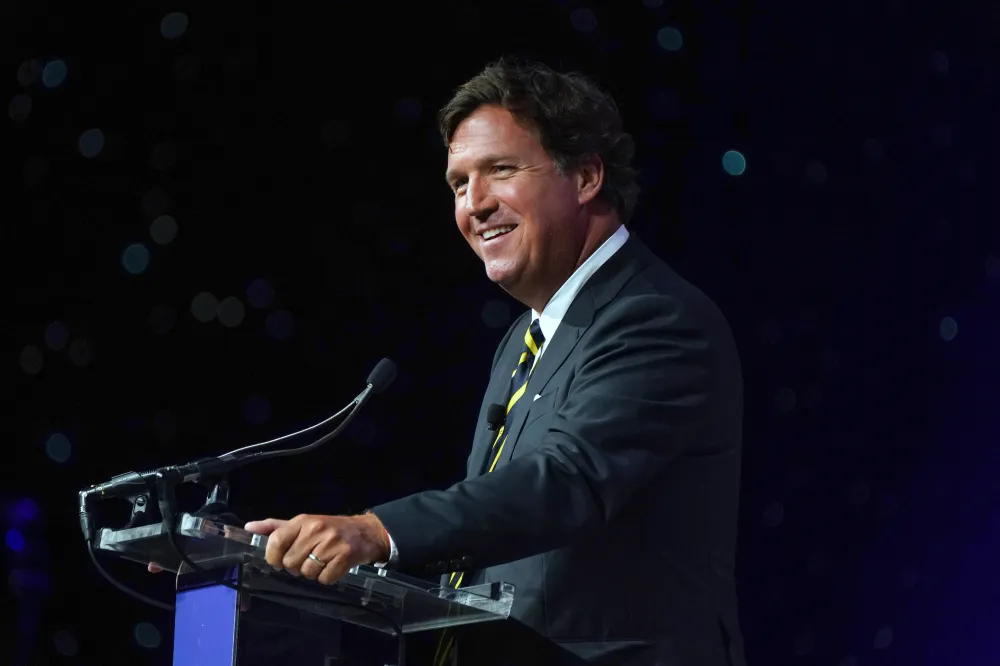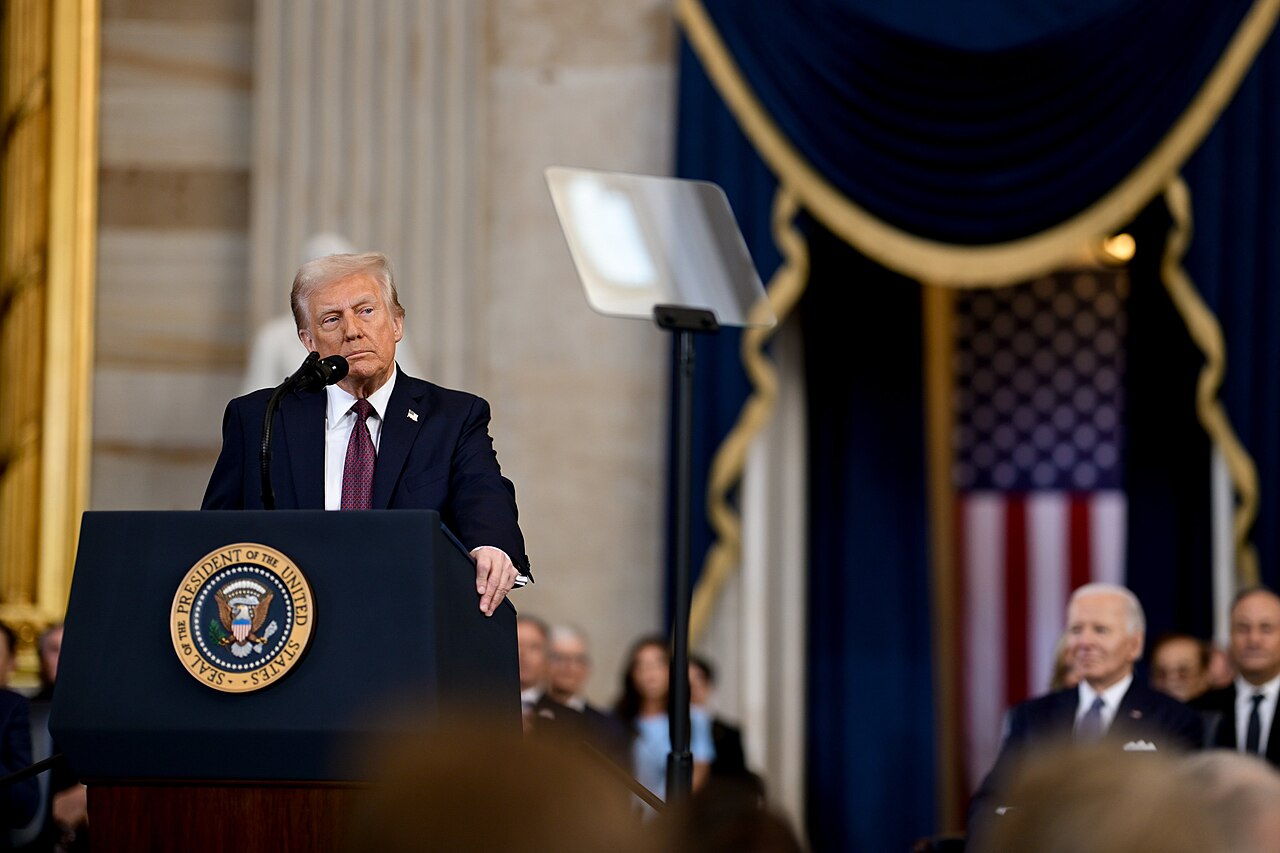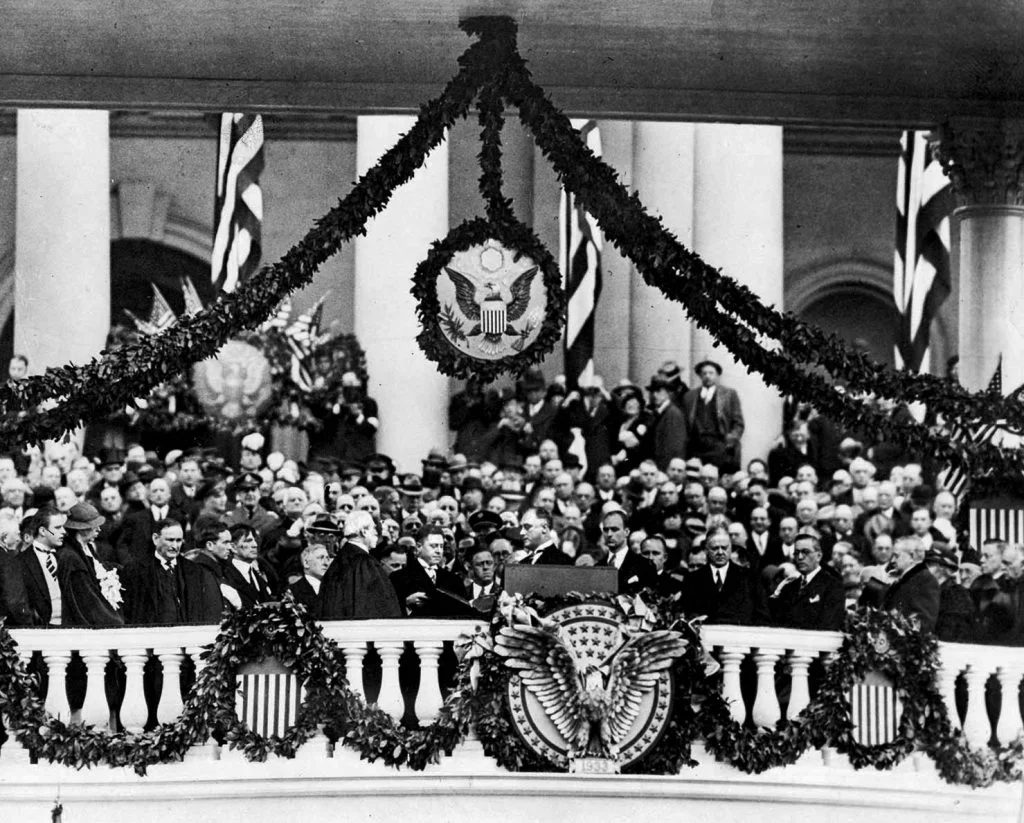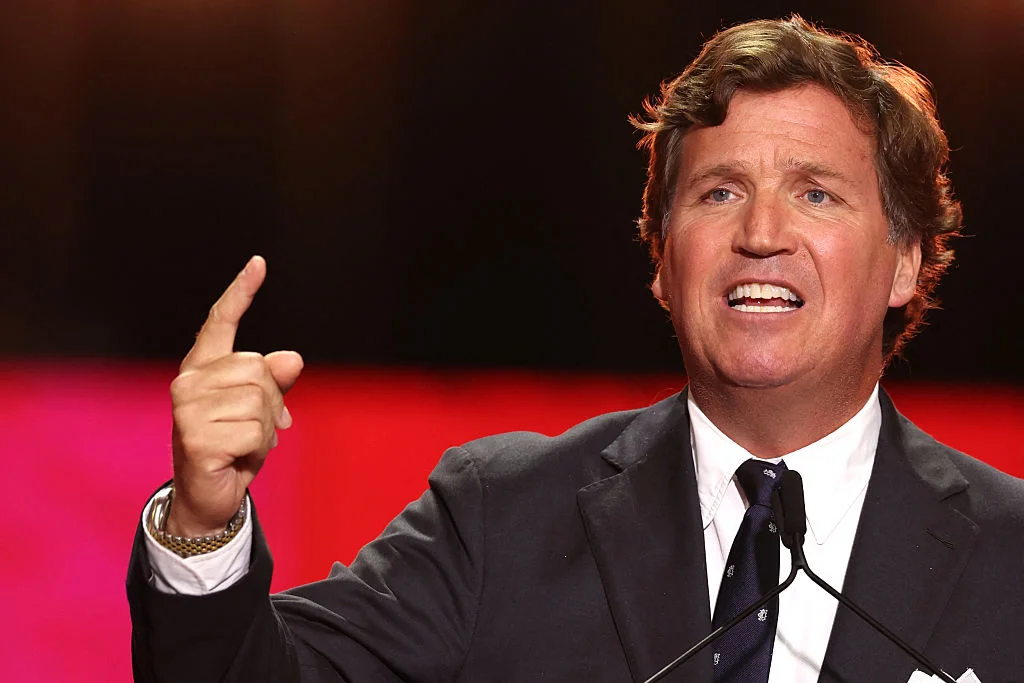
Tucker Carlson’s Sinking Ideological Ship
Tucker Carlson’s embrace of Nick Fuentes might perhaps be what finally divides the base between those who want to remain on Carlson’s sinking ship and those who would return to constitutional conservatism.
I have never been a fan of Tucker Carlson. Fifteen years ago, however, I could forgive conservatives for enjoying his brand of political entertainment. It was McDonalds, yes, but as Jim Gaffigan says, “everyone has their McDonalds.” But in the last few years, Carlson has become increasingly deranged in his public persona, whatever his actual beliefs or motives. From defending Russia’s invasion of Ukraine to the platforming of a fake historian with Nazi sympathies who considers Churchill the true villain of World War II, he has moved far beyond the pale.
Increasingly, conservatives are waking up, too. His anti-Israel, even antisemitic, insinuations have become increasingly evident, never more so than in his recent softball interview of the antisemite Nick Fuentes, who has professed admiration for Hitler and the eradication of Israel. How did we get here? For years, Carlson from his perch on the primetime slot at Fox News gained the trust of the right by attacking the left and reliably supporting Trump. He was, at times, a maverick voice against the overreach of government power during the covid crisis and the left-wing identity politics that thrived during this period. Having earned that trust, he gradually led his audience from some form of American conservatism to a right-wing, reactionary stance — more tribal than intellectual — and more useful to foreign autocrats than to American citizens. Conservatives should get off this sinking ship before it is too late.
Tucker Carlson’s New Right-Wing, Unconservative Philosophy
Carlson is not alone in abandoning the American conservatism of people like Ronald Reagan, but he is at the forefront of accelerating its abandonment, even to an extent that President Donald Trump would never support. American conservatism before 2016 was typically both conservative and American, that is, favorable to conserving constitutional democracy, that great experiment in self-government that Abraham Lincoln, Dwight Eisenhower, and Ronald Reagan were all so intent on conserving. American conservatism was “right-wing” only in relation to the left-liberalism of Democrats, but it was not right-wing in a sense compatible with the continental European right, at least not as it was understood before World War II. Those older right-wing movements were typically nostalgic, tribal, often anti-Semitic, anti-market, and favorable to monarchs and strongmen, and at times, even revolutionary.
Post-war American conservatism was defined by what it took for granted — American constitutional democracy — and what it resisted, the excesses of the New Deal era. Concessions were made, of course, and sometimes social trends moved the conservative movement in beneficial directions that conservatives would come to embrace, sometimes not. The most conservative wing, not the most right wing, emerged as the more classically liberal, cosmopolitan, and yet culturally conservative movement led by Ronald Reagan, a coalition that many embraced as part of a fusionist vision, like that defended by National Review’s Frank Meyer.
After Reagan, the conservative movement happily adopted these ideas, or at least stayed close to them. Tucker Carlson was never a Reaganite purist, but he was a libertarian-leaning conservative who operated within a broadly conservative, classical liberal framework. That was how he was when he was still writing for the Weekly Standard and other publications before his time at CNN, MSNBC, and later Fox News. In the late ‘90s, he was still critical of Pat Buchanan's paleoconservative movement, which he would later support. He did not fit in as well with George W. Bush’s party after 9/11, and this eventually made him reconsider paleoconservative views, especially after he began working at Fox News in the late 2000s. We are all familiar with his more populist, anti-immigration stance that he has come to adopt, especially after Trump’s rise, and his increasingly isolationist, even anti-anti-Putin, if not pro-Putin, views since 2022.
It was during those years, from 2016 onward, when Carlson defended Trump and consistently opposed the left on matters of immigration and populism, that he earned the trust of a large following on the right. More intellectual conservatives, such as George Will, still guided by a conservative philosophy, could not entertain these developments. Since then, Carlson’s fans have been like frogs slowly boiling in water, increasingly rationalizing the radical ideas he has promoted, even ideas starkly opposed to what President Trump supports, such as Carlson’s opposition to Israel.
Those of us guided by the fusionist, American constitutional-democratic philosophy linked to Reaganite conservatism, have had to realize that many of our allies in the conservative movement are motivated more by the communal side of politics than by rooted philosophical principles. This communal aspect has increasingly drifted away from reason and the sober limits of what politics can achieve. Many of the older conservatives who were strong supporters of Reagan have gradually shifted over the past few years through this tribal conflict with the left. That’s why they fail to recognize that they now support ideas vastly different from those they championed during the Reagan era. The recent incoherent reaction from some on the right to the Canadian free-trade ad featuring Reagan—with many acting as if the ad was deceptive for showing Reagan defending free trade—illustrates the kind of cognitive dissonance that arises when they try to reconcile Reagan and Trump philosophically, much less Reagan and Tucker Carlson.
So, how bad has Tucker Carlson become? If one considers how radical, illiberal, bigoted, and anti-American Nick Fuentes is, one sees clearly that Tucker Carlson is leading an army of fury and unreason. Those who have followed Carlson to this point had better jump off if they do not want to lose everything that ever mattered to American conservatism and to our country.
All one has to do is compare Tucker Carlson’s interview of Nick Fuentes with his interview of Ted Cruz to see that Carlson is easily capable of asking his interviewees tough questions to challenge them, but in the case of Fuentes, he offered him softball after softball, nodding along despite Fuentes’s open hatred for Jewish people and Israel and many other groups of people, whether it was affirming mass murderer and enemy of America, Joseph Stalin or blaming women for the marriage crisis. Nobody who has paid attention to Carlson or Fuentes saw it as anything but an attempt to normalize Fuentes, who now has over a million followers on X.
Those who have followed Fuentes also know that there is no room for normalizing him. Fuentes embraces a kind of radical, reactionary Catholic traditionalism, not that he can remotely be understood as in communion with the Church, that has been aptly compared to that of Fr. Charles Coughlin, the fascist sympathetic priest who had a popular radio program with as many as 42 million devoted listeners during the Great Depression. Fr. Coughlin embraced the Judeo-Masonic conspiracy theory, a popular notion among continental European conservatives at the time. This put Coughlin at odds with much of the American clergy, especially the more sensible ones, such as Fulton Sheen.
According to Judeo-Masonic-Bolshevik conspiracy theory, both liberal democracy and communism were the product of a secret cabal of international, cosmopolitan Jews, who sometimes spread their influence through Masonic lodges. Any theory that posits Jews conspiring across national borders to push both capitalism and communism should invite healthy skepticism, but it convinced many who wanted to believe it. Fr. Coughlin even published translations of the already debunked Protocols of the Elders of Zion in different issues of Social Justice in 1938. Members of the Russian secret police had produced the Protocols at the beginning of the twentieth century. It purported to lay out the plans for a Jewish conspiracy, but anyone who reads it with a critical eye can see that it is fake, and it was thoroughly debunked when it was shown to have plagiarized an 1864 French satire by Maurice Joly.
Nick Fuentes and his crude, folkish, nasty cult of “Groypers” as they call themselves, many of whom embrace his traditionalist ideology, find in the reactionary Catholic authors of early twentieth century Europe a kind of justification for this scapegoating of the Jews, and confirmation that Jews have been working against their ideals of civilization for generations (even if these lies equally deluded these earlier authors). The data that gives rise to these theories is often nothing more than a recognition of the common Jewish interest in survival and emancipation, not any consensus about political regimes or animosity toward Christians. Other times, it is based on recognition of the disproportionate success of Jews, which, for whatever odd reason, breeds resentment among insecure people who obsess about how many Jews are in things.
In Carlson’s interview with Fuentes, this is all clear, with Fuentes stating that his political worldview is against “organized Jewry in America,” to which Carlson happily nods without any opposition, unlike his reaction to the ideas of Ted Cruz or other proponents of Israel. Anyone who has paid attention to Carlson over the last couple of years is not entirely surprised, as he has become increasingly obsessed with the Jewish influence on American politics, even if he is more veiled in his choice of words. Even in the interview with Fuentes, Carlson calls Christian Zionism a “heresy.”
This interview triggered outrage on social media, even among some rather right-wing populist accounts. And yet, even after this Fuentes interview, Kevin Roberts, President of the Heritage Foundation, not only refused to distance himself or the Heritage Foundation from Carlson, but explicitly reaffirmed the partnership between Heritage and Carlson. This, despite the overwhelming evidence of his decline into right-wing antisemitic conspiracy theories. That is a gamble, to say the least. The elasticity of the Republican base has exceeded all expectations to date, but it is not infinite. Tucker Carlson’s embrace of Nick Fuentes might perhaps be what finally divides the base between those who want to remain on Carlson’s sinking ship, a group more likely to support J.D. Vance, and those who would rather return to more traditional conservatives like Ted Cruz, Marco Rubio, Nikki Haley, Brian Kemp, Spencer Cox, or Ron DeSantis. We will have to wait and see. But it should be clear to all that what Carlson is defending is closer to what our parents and grandparents fought against in World War II than anything that can be called American conservatism.
Thomas Howes has a PhD in Philosophy from the Catholic University of America and is a member of the James Madison Society at Princeton.
Politics
.webp)
Liberal Democracy Reexamined: Leo Strauss on Alexis de Tocqueville
This article explores Leo Strauss’s thoughts on Alexis de Tocqueville in his 1954 “Natural Right” course transcript.
%20(1).avif)
Long Distance Migration as a Two-Step Sorting Process: The Resettlement of Californians in Texas
Here we press the question of whether the well-documented stream of migrants relocating from California to Texas has been sufficient to alter the political complexion of the destination state.
%20(3).avif)
Who's That Knocking? A Study of the Strategic Choices Facing Large-Scale Grassroots Canvassing Efforts
Although there is a consensus that personalized forms of campaign outreach are more likely to be effective at either mobilizing or even persuading voters, there remains uncertainty about how campaigns should implement get-out-the-vote (GOTV) programs, especially at a truly expansive scale.

International Law Is Holding Democracies Back
The United States should use this moment to argue for a different approach to the rules of war.

Trump purged America’s Leftist toxins. Now hubris will be his downfall
From ending DEI madness and net zero to securing the border, he’ll leave the US stronger. But his excesses are inciting a Left-wing backlash

California’s wealth tax tests the limits of progressive politics
Until the country finds a way to convince the average American that extreme wealth does not come at their expense, both the oligarchs and the heavily Democratic professional classes risk experiencing serious tax raids unseen for decades.

How FDR’s Bold Experimentation Blinkered the American Economy
Overall, False Dawn is a disciplined, evidence-heavy challenge to the New Deal’s most self-flattering myth: that bold experimentation rescued the American economy.














